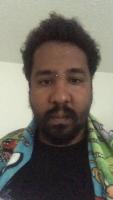On reading Christopher Shipman’s “The Movie My Murderer Makes: Season II”
What do horror films and surreal prose have in common? In Christopher Shipman’s two-book series The Movie My Murderer Makes, Seasons I and II (The Cupboard, 2014 and 2019), the author questions the horrors of personal identity and the conflicts between duty and impulse in prose poems that follow a flashback narrative of micro-moments. In Shipman’s poems, the absurd idea of identity takes shape between two main characters, a protagonist, strictly referred to in first-person narrative, and his “murderer,” an imaginary but nonetheless powerful, necessary, and mercenary presence in his life. In the first book of the series, the “murderer” was more of an idea; in the second, he comes even closer to a physical presence, a shadow behind the protagonist’s decisions, a guilty memory, or a bridge in his identity.
The poems are surreal in the way that they blend the idea of the “murderer” and moments within the poems, almost like a Luis Buñuel film where the surreal elements stay unexplained, but fit the landscape of the work. The “murderer” himself seems to be a blend between reality and the world of intentions. Compared to the first book, the poems have become increasingly creepy, and the “murderer” more vivid. The story inches closer to a horror film, that scene when protagonists find out unpleasant secrets, searching in the shade.
The poems sound like oral tales, warnings about his “murderer,” the ways in which his “murderer” kills again and again and again. The book beings “My murderer stalks an island at night. At the end of the day, when he’s finished filming whatever momentous or mundane scrap of life deemed desirable enough to capture with fancy cameras, he packs up all his gear, clicks off the lights, and sends the extras home. My murderer’s home, as far as I can see, is an act of wandering off (p3, “Episode I: A Circle of Sharks”).”
Shipman opens the book like a horror flick. He introduces this imaginary nemesis like a frightening integral part of the protagonist’s life and character, his “murderer” that lives near “A Circle of Sharks,” and this sets the tone and suspense.
I particularly loved the play on real vs fictional / imaginary environments in the book. The way the protagonist speaks of the murderer makes his, the murderer’s, presence real, more like an annoying neighbor or father. “Sometimes my murderer breaks into my house when I’m gone to the grocery store and slants the family photos. He only does this when he knows I’ve been home alone for a few days and will return again to an empty home. Arms filled with too many bags, keys between my teeth, apples toppling to the floor, and my phone buzzing in my pocket. I gather the groceries and check my phone, but not until I hear the quiet, after-music click of a record spinning on the turntable-usually Springsteen-do I notice the photos. The way my murderer slants the frames makes me think he’s trying to tell me to carve his initials into a tree (p11 “Episode VIII: Dancing in the Dark”).”
There is a menace of death throughout the book, a silent suspense, both murderous and humorous “Whenever I wake from bad dream, my murderer gives me homework… ‘This is your story,’ he says. ‘This is its beginning. Get to know your story as if you were holding the story in your palm, running your fingers through its feathers. Commit its color to memory. Tell your story to yourself until you are telling it to someone else. Until this is the only story you have ever told…’ Again, he has taken the morning and its moon and all its breathy promises with him. I imagine a cat licking itself. I let it lick itself to death. Then I begin to read my homework: There is a thought you can think. When you possess this knowledge you will die. I am no mystic or conspiracy theorist or signpost preacher. I know this because I am dead. And this thought killed me. I will not reveal the thought to you. Only the nature of dream ever makes one morning different from the rest” (p33, “Episode XVI: The Process of Giving”). The book takes me to the horror show of my mind, my murderer being myself and myself, my murderer, struggling between identity and death. This wonderful piece of literature is worth a second read, because I am still relishing its effects on me, and I hope to take it one day to the coffee shop with my “murderer.”

Darryl / Dadou / Baron Wawa is a Port-au-Prince born Haitian-American who studied Photography and Creative Writing. He enjoys chocolate and good books. That said, maybe a movie is a good book. He loves to work with images and words and their pairing.


